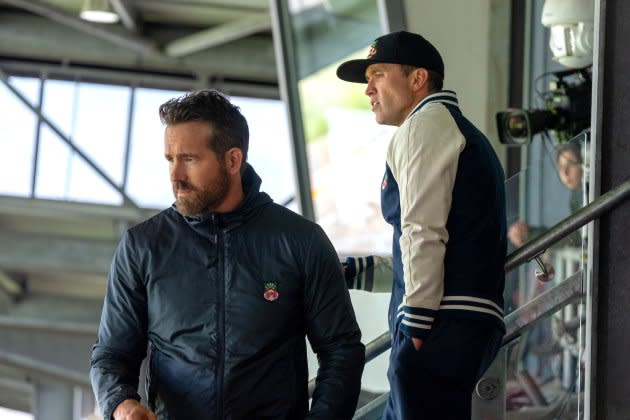‘Welcome to Wrexham’ Season Two Has Less Ryan Reynolds, But Plenty of Magic
- Oops!Something went wrong.Please try again later.
- Oops!Something went wrong.Please try again later.
- Oops!Something went wrong.Please try again later.

The second season of the FX soccer docuseries Welcome to Wrexham poses an implicit question: Can a formerly floundering team recently purchased by two showbiz stars, a team that has made legions of new fans through a breakout TV hit, still be considered a group of scrappy, lovable underdogs? The series doesn’t shy away from the prefab nature of its inspirational story; that would be hard to do with Ryan Reynolds and Rob McElhenney popping in and out to comment on the state of their team and even occasionally visiting the working-class Welsh town where the suddenly much-improved Wrexham A.F.C. plays. We also hear from a few haters and opposing fans who resent these deep-pocketed outsiders and their socioeconomic experiment. It’s hard to blame them.
But it’s also difficult to muster much genuine enmity for McElhenney, Reynolds, and their made-for-television success story, or to feel the kind of schadenfreude that greets, say, hedge funder Steve Cohen when he pumps gobs of cash into a still-mediocre Mets team. Wrexham, the team and the town, are overflowing with human-interest stories, and still scarred from a lengthy economic downturn. Yes, the new owners have signed checks to procure better players and stadium improvements. Yes, the series brings in fans from far-flung lands — Thailand, Brazil, even some place called the United States. And yes, in the series the team now has a legit shot to move up and escape from the fifth-tier National League. (Semi-spoiler alert: You can easily go online and see if they succeeded.)
More from Rolling Stone
Here's How to Watch Sports on ESPN, Even If You Don't Have Cable
Queen Latifah Leads Giants-Cowboys Game With Riveting National Anthem Performance
Jets vs. Bills Livestream: How to Watch the Football Game Online for Free
All of which raises another implicit question: What’s wrong with any of that? From this vantage point, not much. Premiering Sept. 12, its second season, or at least the four episodes that were made available to critics, Welcome to Wrexham continues to acknowledge its Hollywood origins with a self-deprecating nod and wink. We see the longtime owner of The Turf, the bar attached to the team’s stadium, gently chase some American tourists away in the midst of an interview. The low-key brash McElhenney, best known for FX’s It’s Always Sunny in Philadelphia, and the soft-spoken Reynolds, who continues to print money with the Deadpool movies, aren’t on camera as much as they were in Season One, and when they are, they strike a nice balance between giving a damn and offering the right kind of non-meddling support (which includes opening their wallets when needed).
More importantly, Welcome to Wrexham is generally good TV, and it continues to home in on worthy tales within the bigger story. The second episode of the new season turns into an empathy-rich look at autism, told through two characters: Albi Mullin, the toddler son of star forward Paul Mullin; and Millie Tipping, a 17-year-old Wrexham superfan who finds meaning in her favorite team. As Wrexham’s fortunes have improved, so have Millie’s spirits, and this is where it really gets difficult to fault the Welcome to Wrexham experience. It might sound cheesy, but both the team and the series have infused a struggling community with an intangible ingredient: hope. The episode ends with Millie taking her place in the stands and affixing the earmuffs that block out the stadium noise; on cue, the soundtrack mutes for the game’s highlights as we see Millie grinning from ear to ear. It’s a lovely bit of no-frills filmmaking.
The new season also introduces us to the truly dominant soccer team in Wrexham. That would be the senior women’s squad, led by a goal-scoring machine named Rosie Hughes. Her day job is at a sprawling prison complex; the women’s team also seeks to move up a tier, largely so they can start getting paid. Not paid more, just paid, period. They play before a fraction of the fans that cheer for the men, but you have to think that, too, will soon change, thanks to the power of television.
Again, Reynolds and McElhenney, who are also executive producers, know good TV, and good PR. But Wrexham also seems to be a force for positive change. The laboratory is a single, slightly-less-humble-than-before Welsh town, but the results are shared by audiences around the world, who have come to have an emotional stake in Wrexham A.F.C.’s fate. Social engineering? Of course. Manipulative? Yeah, a little. But the series continues to make it very easy to cheer right along with the faithful.
Best of Rolling Stone
